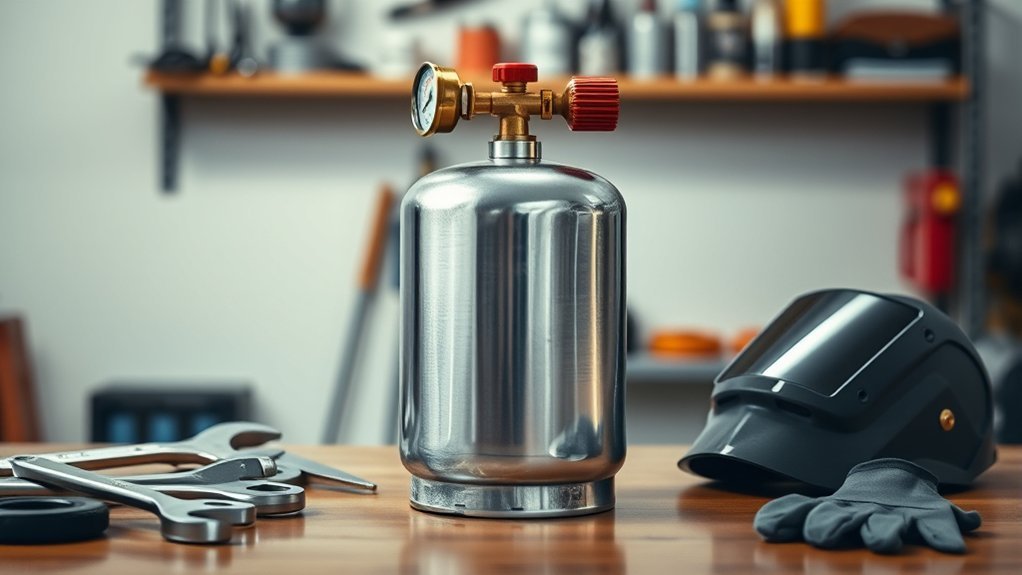A small welding tank, like a 20 CF model, usually costs between $150 and $200 when you buy it full. You’ll find that the refill expenses typically range from $20 to $35 every 4-6 months. While these tanks are convenient and portable, they require more frequent refills compared to larger tanks. Understanding the full costs and options available can notably influence your choice. Keep exploring to discover more about making the best tank decision for your needs.
Understanding Small Welding Tanks
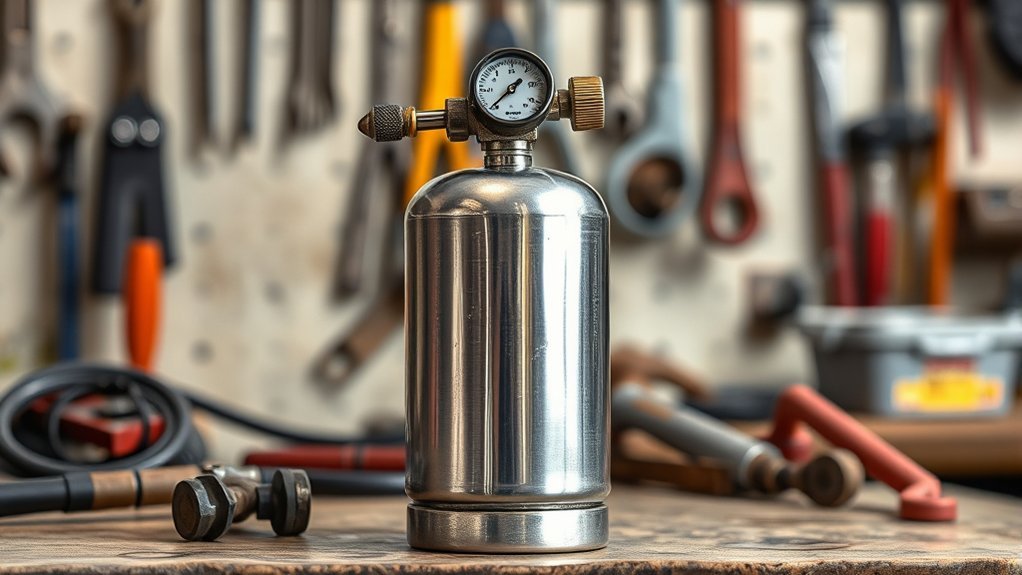
When you’re considering small welding tanks, it’s essential to understand their specifications and applications.
Small tanks, like the 20 cubic feet (CF) model, are designed for portability and convenience, making them perfect for various welding tasks in tight spaces. They typically cost between $150 and $200 for a full tank and can last around 4-6 months, equating to approximately 10,000 welds, depending on your usage.
Refilling these tanks usually sets you back $20 to $35, varying by region and supplier. For those needing a one-time solution, options like the Argon Mini are available, priced around $45, but keep in mind they’re non-returnable due to shipping regulations.
Understanding these details will help you choose the right tank for your specific welding needs while ensuring you’re prepared for both operational and logistical considerations.
Initial Costs of Small Welding Tanks
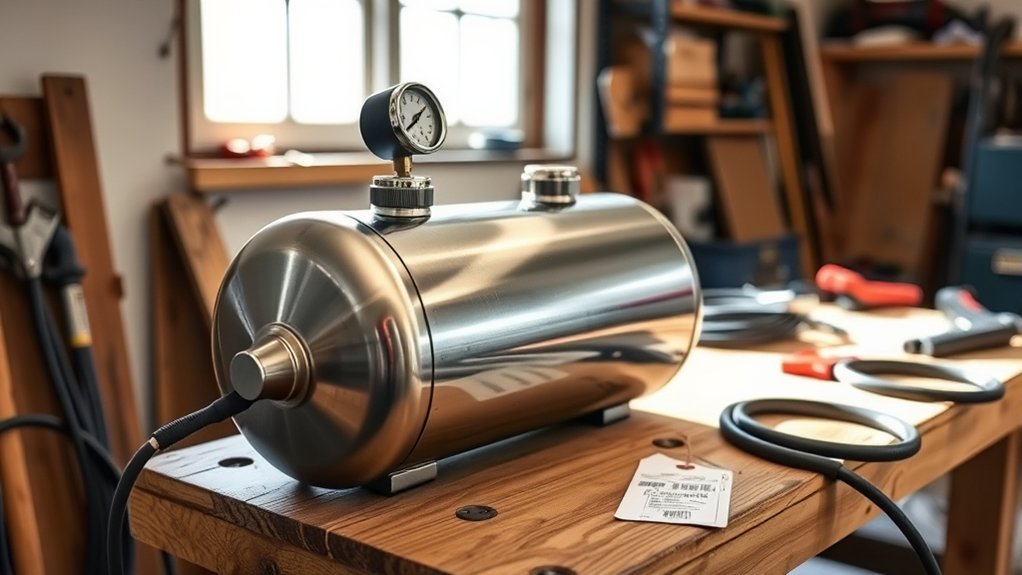
The initial costs of small welding tanks can vary considerably based on size, type, and supplier.
The initial costs of small welding tanks vary significantly depending on size, type, and supplier.
Generally, you can expect the following price ranges:
- A 20 CF tank typically costs between $150 and $200 when purchased full.
- A 40 CF tank, common for TIG welding, ranges from $230 to $260.
- Additional fees, such as a hazardous material shipping fee, can add about $45 to your total cost.
Keep in mind that prices can fluctuate due to regional market conditions and whether you choose to lease or buy the tank outright.
Smaller tanks, like the 20 CF, may seem cheaper initially, but they often require more frequent refills, impacting overall cost efficiency in the long run.
Assess your specific welding needs to determine the best tank type and size for your projects.
Average Refill Expenses
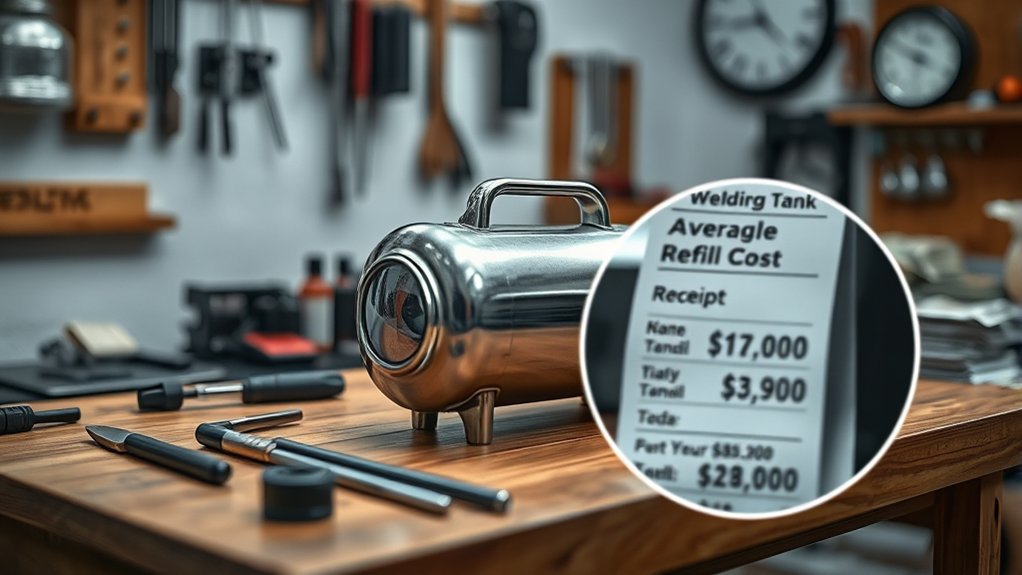
After considering the initial costs of small welding tanks, it’s important to factor in the average refill expenses, which can greatly impact your overall budget.
For a 20 CF tank, you can expect refill costs to range from $20 to $35, depending on your location and supplier. A 40 CF tank generally costs around $60 to refill, making it a more economical choice over time.
If you opt for an 80 CF tank, refill expenses increase to about $70; however, these larger tanks require fewer refills, ultimately saving you money.
Your refill frequency will depend on your usage rate; typically, a 20 CF tank lasts about 4-6 months under normal conditions.
When calculating the total cost of ownership for welding gas tanks, it’s essential to include both the initial purchase price and these ongoing refill expenses to guarantee accurate budgeting.
Factors Influencing Tank Costs
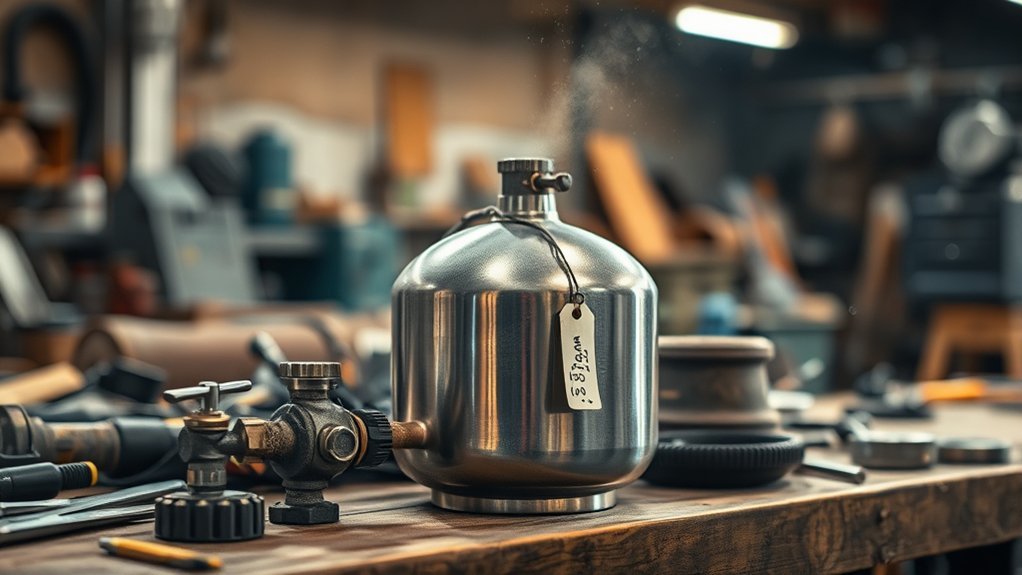
When considering the cost of a small welding tank, tank size plays an essential role in both initial purchase and long-term expenses.
Smaller tanks, like the 20 CF variety, may seem cheaper upfront but require more frequent refills, impacting your overall budget.
Additionally, your refill frequency will directly influence ongoing costs, making it important to weigh these factors carefully.
Tank Size Impact
Small welding tanks, such as the commonly used 20 cubic feet (CF) model, greatly affect overall costs due to their size and refill requirements. Here are a few factors to take into account:
- Initial Cost: A 20 CF tank typically costs between $130 and $160, making it an affordable entry point.
- Refill Costs: Refilling this tank usually ranges from $20 to $35, which can add up with frequent usage.
- Operational Impact: Smaller tanks may require more frequent refills, raising your long-term expenses compared to larger tanks.
While these smaller models are ideal for limited spaces, their higher cost per cubic foot of gas can considerably affect your overall operational costs in the long run.
Refill Frequency Considerations
The frequency at which you need to refill a small welding tank, like the 20 CF model, plays a considerable role in overall cost management.
Typically, you’ll find yourself refilling every 4 to 6 months, depending on your usage and flow settings. A smaller tank can average around 10,000 welds before needing a refill, but this varies with the intensity and type of welding you perform.
The refill costs usually range from $20 to $35, making it economical for light tasks. Factors such as the type of gas, welding technique, and pressure settings considerably influence depletion rates.
To estimate tank duration, divide the tank’s volume by your gas flow rate, which often ranges from 10 CFH to 40 CFH.
Cost Comparison: Small vs. Large Tanks
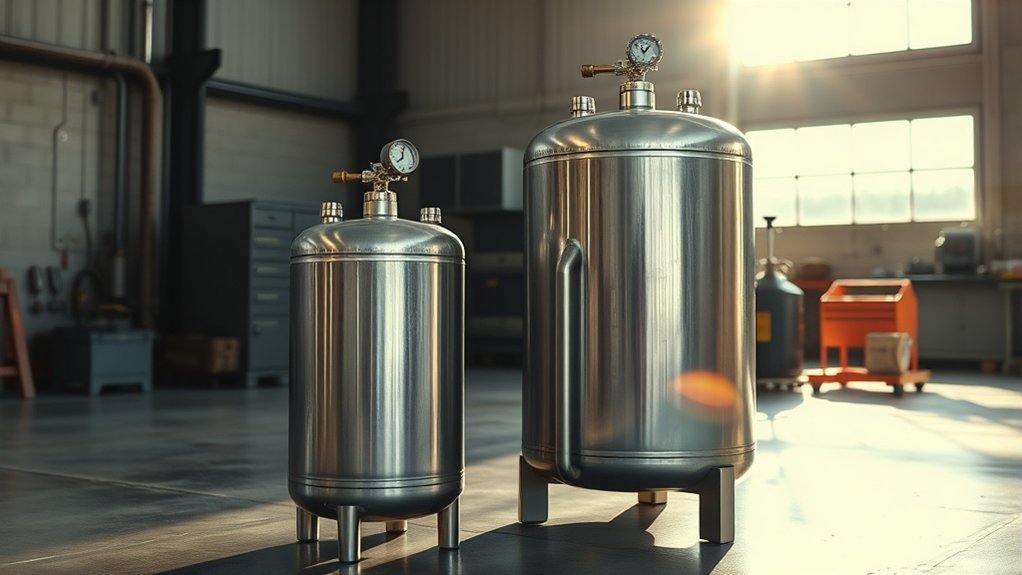
While considering your options for welding tanks, it’s important to weigh the cost differences between small and large tanks. Here’s a breakdown to help you decide:
- Initial Investment: A small 20 CF argon tank costs between $100 and $150, while a larger 40 CF cylinder typically ranges from $230 to $260.
- Refill Costs: Refilling a small tank usually costs around $20 to $35, but larger tanks incur refill costs closer to $60.
- Lifespan and Value: A small tank lasts about 4-6 months with regular use compared to larger tanks, which last longer, offering better long-term value for frequent welders.
Ultimately, while small tanks may seem more affordable initially, larger tanks often provide better cost efficiency over time, particularly for those who weld regularly and require consistent gas supply.
Calculating Long-Term Expenses
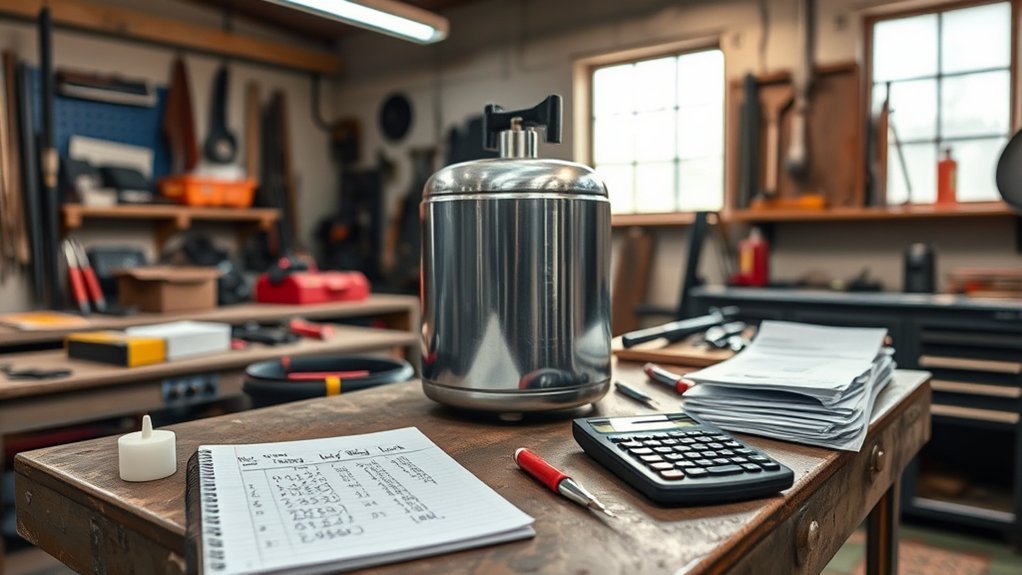
When calculating long-term expenses for a small welding tank, you need to take into account both the initial purchase price and ongoing refill costs.
A 20 CF tank typically costs between $230 and $260, while refills can range from $20 to $35 each.
Over time, these expenses can add up considerably, so understanding your usage patterns is essential for budgeting effectively.
Initial Purchase Price
Investing in a small welding tank, like a 20 cubic feet (CF) model, typically costs between $230 and $260, depending on your chosen supplier and brand.
While the initial price is manageable, consider the following factors that affect your overall expenses:
- Refill Frequency: Smaller tanks require more frequent refills, which can add up quickly.
- Refill Costs: Expect to pay between $20 and $35 for each refill, impacting your long-term budget.
- Usage Lifespan: A 20 CF tank generally lasts about 4-6 months or approximately 10,000 welds, affecting your workflow.
Ultimately, weighing these factors against a larger tank’s cost can help you make a more economical choice in the long run.
Ongoing Refill Costs
Understanding ongoing refill costs is essential for calculating your long-term welding expenses. For a small 20 CF argon tank, you’ll typically pay between $20 and $35 per refill, depending on your location and supplier.
If you’re a frequent user, consider a 40 CF tank, which costs around $60 to refill, offering better value. The average lifespan of a 20 CF tank is about 4-6 months, allowing for roughly 10,000 welds, impacting how often you’ll need to refill.
Larger tanks, like an 80 CF, cost about $70 per refill, reducing the frequency of refills and making them more economical in the long run. Budgeting for these costs is vital for your welding projects.
Where to Buy or Refill Welding Gas
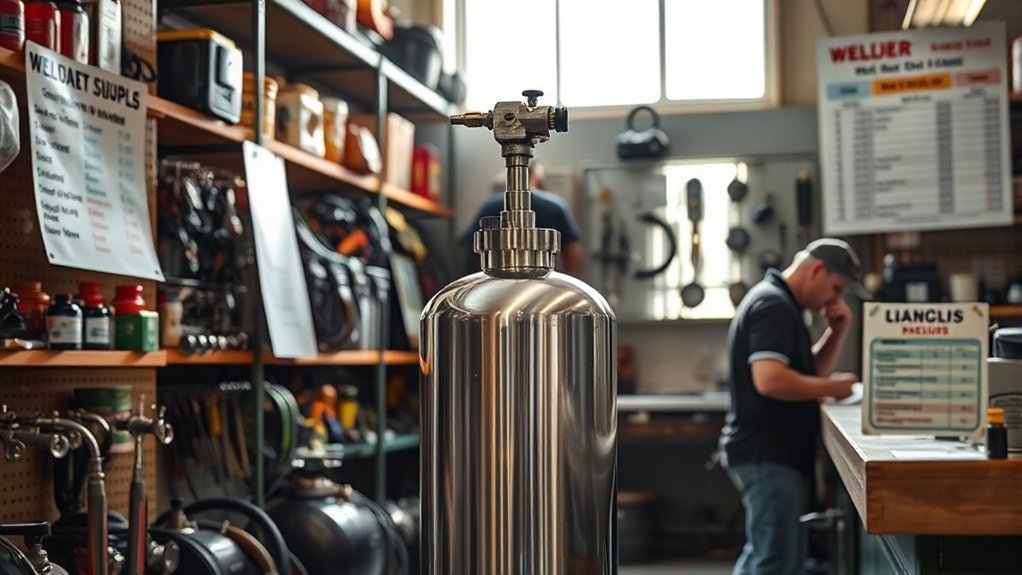
Finding the right place to buy or refill welding gas is crucial for maintaining your projects’ efficiency and safety.
You have several options to ponder:
- Local Gas Dealers: Many local welding supply stores offer refilling services, with costs typically ranging from $20 to $70 based on tank size and gas type.
- Major Suppliers: Retailers like Northern Tool and AirGas offer both purchase and leasing options. Leasing allows you to refill tanks instead of buying them outright, which can be more cost-effective.
- Online Purchases: You can also find welding gas tanks online, but make sure to compare prices across different suppliers to confirm you’re getting the best deal.
Don’t forget to check if the retailer provides necessary accessories, like regulators and hoses, which are crucial for using your welding gas tanks effectively.
Tips for Cost-Effective Welding Solutions

When you’re looking to save on welding costs, consider your options carefully, as small adjustments can lead to significant savings.
Start by evaluating whether you need to purchase a small tank, like a 20 CF argon tank, which typically costs between $180 and $250. For infrequent use, renting a tank can help you avoid upfront expenses.
If you’re working on larger projects, investing in an 80 CF cylinder may be more cost-effective due to lower refill rates. Refilling a small tank generally costs around $20 to $35, which can be manageable for hobbyists.
Additionally, consider buying a regulator and hose as a package deal; this not only saves money but guarantees compatibility for efficient welding.
Finally, monitor your usage and flow settings to optimize gas consumption, which can further reduce overall costs in the long run.
Frequently Asked Questions
How Long Does a Small Welding Tank Typically Last?
A small welding tank typically lasts between 4 to 12 hours of continuous use, depending on the welding process and settings. You can extend its lifespan by using it efficiently and maintaining proper pressure levels.
Can I Rent a Small Welding Tank Instead of Buying?
Absolutely, you can rent a small welding tank! Renting’s a resourceful route, saving you some serious cash while providing the flexibility to use various tanks without the commitment of purchasing. Explore local rental options today!
What Types of Gases Can Be Used in Small Welding Tanks?
You can use various gases in small welding tanks, including oxygen, acetylene, argon, and carbon dioxide. Each gas serves specific welding processes, so choose the appropriate one based on your project requirements and techniques.
How Do I Safely Store a Small Welding Tank?
Store your small welding tank upright, secure it to prevent tipping, and keep it in a well-ventilated, cool area away from flammable materials. Regularly check for leaks and maintain proper cylinder maintenance for safety.
Are There Any Warranties on Small Welding Tanks?
Yes, many manufacturers offer warranties on small welding tanks, typically covering defects in materials or workmanship. It’s crucial to check the specific terms provided by the manufacturer to understand the coverage and duration.
Conclusion
In conclusion, understanding the costs associated with small welding tanks is essential for budgeting effectively. By considering initial expenses, refill costs, and long-term expenses, you can make informed decisions that align with your needs. Whether you choose to buy or refill, weigh your options carefully. Ultimately, investing wisely in your welding equipment and exploring cost-effective solutions can enhance your efficiency, improve your skills, and elevate your projects to new heights.

